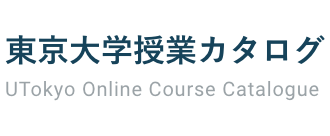過去(2019年度)の授業の情報です
学内のオンライン授業の情報漏洩防止のため,URLやアカウント、教室の記載は削除しております。
最終更新日:2024年4月1日
授業計画や教室は変更となる可能性があるため、必ずUTASで最新の情報を確認して下さい。
UTASにアクセスできない方は、担当教員または部局教務へお問い合わせ下さい。
最終更新日:2024年4月1日
授業計画や教室は変更となる可能性があるため、必ずUTASで最新の情報を確認して下さい。
UTASにアクセスできない方は、担当教員または部局教務へお問い合わせ下さい。
Theory of Normativity in Global Society I
Science, Technology & Society (STS) Studies :
Global Environmental Science and Governance
Described as a ‘dynamic and innovative intellectual field’, STS investigates both how science and technology shape social life and the world around us, and how the latter in turn shape developments in science and technology. This course examines the crucial contribution of STS to the ongoing debates over how humans should respond to global environmental change. Through short interactive lectures and a number of case studies focusing on climate change, biodiversity loss, and emerging technologies, we explore from a critical perspective both 1) the social shaping of knowledge about the global environment, and 2) the growing role of science and scientific institutions in identifying and monitoring global environmental change, assessing impacts and shaping responses.
時間割/共通科目コード
コース名
教員
学期
時限
31M350-0322A
GAS-GS6A32L3
Theory of Normativity in Global Society I
ジロドウ イザベル
木曜5限
講義使用言語
英語
単位
2
実務経験のある教員による授業科目
NO
他学部履修
可
開講所属
総合文化研究科
授業計画
WEEK 1 – Is there such thing as ‘global environmental change’? STS perspective
[ Introductory lecture and guidance (basic notions, terminology, course plan, learning methods, readings and other sources’ overview) ]
WEEKS 2/3 – Global environmental science and governance : by whom and using which frames and infrastructures? IPCC and IPBES as illustrations
[ Introductory lecture + short interactive lecture + group and classroom discussions based on pre-assigned readings ]
WEEKS 4/5 – Climate geoengineering and environmental governance
[ Short interactive lectures + group and classroom discussions based on pre-assigned readings + case study ]
WEEKS 6/7 – Risks and regulation of unconventional oil and gas development technology
[ Short interactive lectures + group and classroom discussions based on pre-assigned readings + case studies ]
WEEKS 8/9 – Disaster STS
[ Short interactive lectures + group and classroom discussions based on pre-assigned readings + case studies ]
WEEKS 10/11 – Democratising global risk governance
[ Short interactive lecture + Preparation and simulation of a consultation process ]
WEEKS 12/13 – Environmental justice and scientific knowledge and expertise (from climate change litigation to ecocide)
[ Short interactive lecture + Preparation and simulation of a moot court ]
授業の方法
Classes consist of interactive lectures, followed by both group and classroom discussions generally based on pre-assigned readings. They also include individual or joint oral presentations as well as specific learning activities conducted on a collaborative basis (teamwork), mainly case studies and role-play simulations.
成績評価方法
Evaluation is based on active participation to classroom discussions and learning activities as described above (60%). In addition, students are asked to write two short essays (mid-term and final) on issues discussed in the classroom (40%).
教科書
Will not use texbook.
Most reading materials will be made available in class.
参考書
Will not use reference book.
Reference books will be introduced throughout the course.
履修上の注意
No prior study of environmental regulation and policy is required, but a strong interest and a serious commitment to learning about environmental issues from an interdisciplinary perspective is essential. This class is conducted in the active learning style, and constructive participation by students is highly encouraged.





 大学院
大学院

 マイリストに追加
マイリストに追加
 マイリストから削除
マイリストから削除



